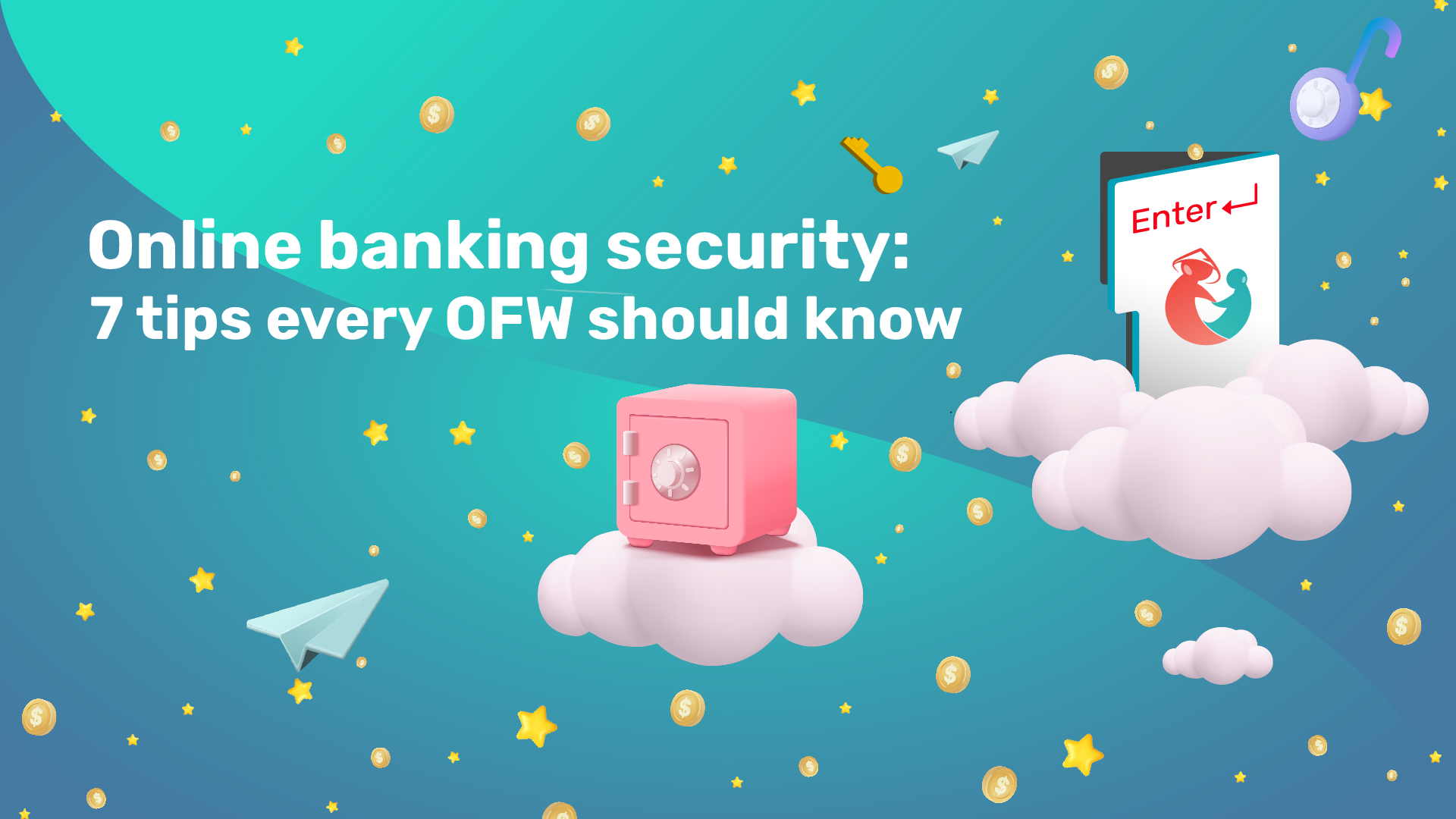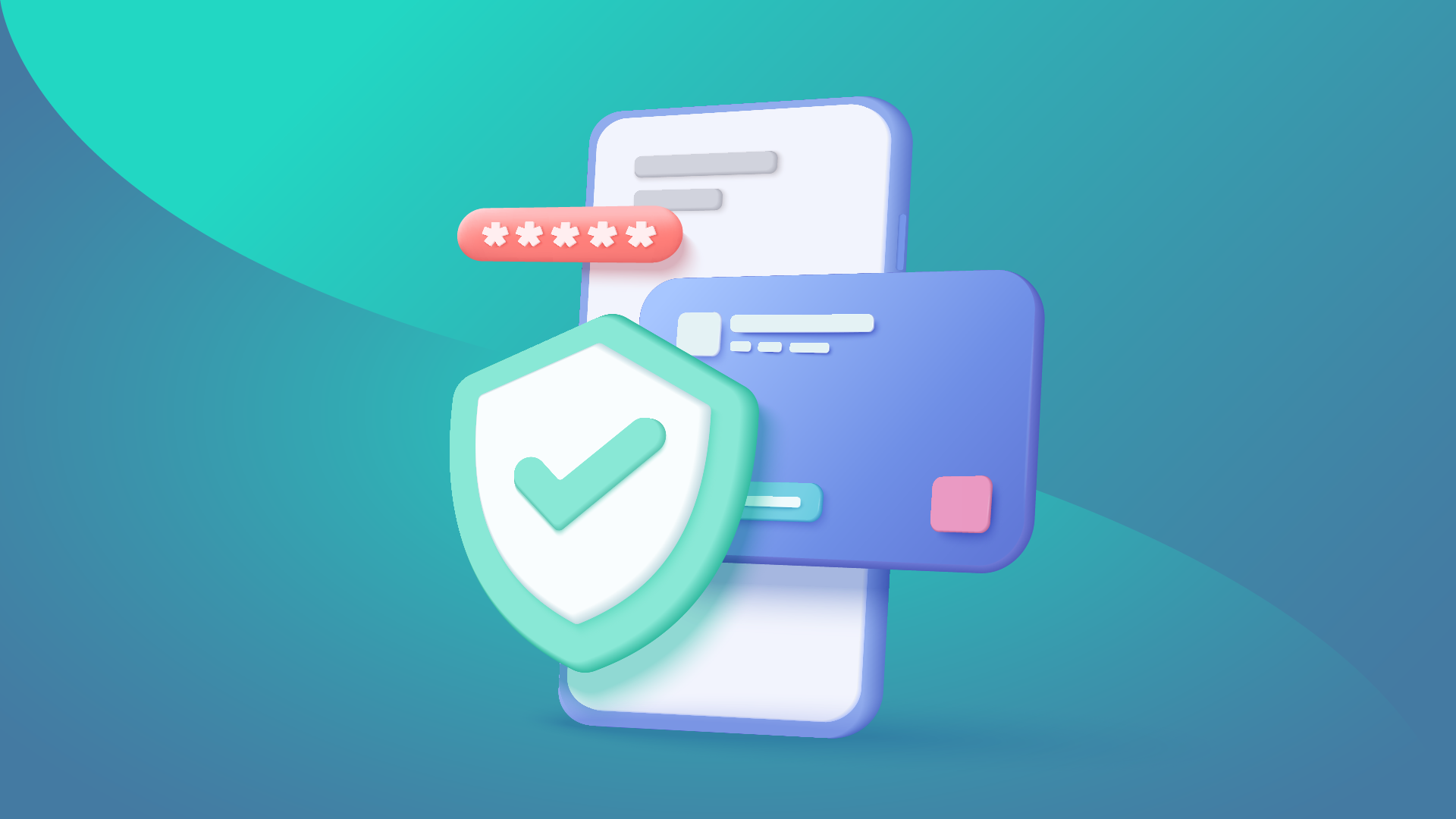
Online banking security: 7 tips every OFW should know
Whether you’re checking your savings account on the Internet or sending money home through person-to-person (P2P) payment apps, you need to be mindful of online banking security measures to keep your funds safe and ensure they reach the people you love.
Before you start signing up for different financial apps in the Philippines or abroad, always keep these seven online banking security measures in mind:
- Create a strong password
- Use multi-factor authentication
- Don’t use public Wi-Fi or shared devices
- Protect your banking devices
- Activate bank alerts
- Beware of phishing and other online scams
- Use secure financial apps
Let’s talk about each e-banking security tip in more detail.
Create a strong password

This applies to both your online banking accounts and the gadgets you use to do your banking.
A strong password will have these qualities:
- Long – A strong password is usually a combination of letters and symbols, a long phrase, or both.
- Devoid of personal information – Your password isn’t your birthday, your name, or the name of someone important to you.
- Mixes letters and symbols – A strong password is difficult to guess when it combines lowercase and uppercase letters with numbers and symbols.
- Avoids sequences – You won’t find sequential numbers, like “1234,” in a strong password.
- Avoids using common words – Popular words are easy to guess, so you won’t find “admin” or “password” in a strong password.
For additional protection, use unique passwords for each of your accounts and change them often. If memorizing all your passwords proves to be difficult, look for a reputable password manager to store your login details and help you create new passwords when the time comes for an update.
Use multi-factor authentication

Also known as two-factor authentication, multiple-factor authentication is an online banking security feature that adds a second and even third step to the typical log-in process. This makes it harder for thieves to access your account, even if they know your username and password.
Extra security measures in multi-factor authentication include:
- One-time passwords (OTP)
- Biometrics or facial recognition
- Codes generated by authentication apps
You can use these same methods to complete money transfers in P2P payment apps.
Don’t use public Wi-Fi or shared devices

Public Wi-Fi opens you up to cyberattacks, allowing hackers to access your data or install malware and spyware. The same goes for opening your online banking account on a shared device, like a computer in a hotel.
According to Aura, an internet safety company, these are the steps you must take if you have no choice but to connect to public Wi-Fi:
- Use secure websites– Secure sites have “https” in their URL and should also activate the padlock icon in your browser.
- Use mobile data – If you need to check your bank account immediately, using your data plan is safer than using a public Wi-Fi connection. You can also bring a mobile hotspot to maintain your privacy.
- Use a VPN – A virtual private network (VPN) encrypts your data and hides your identity from prying eyes.
Protect your devices and update e-banking security features

An outdated app or operating system is vulnerable to hacking. As an online banking security measure, always update your software and programs.
It’s also important to use antivirus software to combat online threats and protect you against dangerous sites.
In a more literal sense, you should also keep track of your banking devices, so they don’t fall into the wrong hands. In case someone steals your device, or you lose it, call your bank or P2P payments provider immediately.
Activate bank alerts

Make sure you turn on your bank and P2P payments apps’ notifications, so you can get quick text or email alerts about possible fraudulent transactions or shady actions in your account, like:
- Unplanned password changes
- Uncharacteristic expenses
- Newly linked devices
- Unrecognisable changes in your balance
- Surprising changes in your account information
If ever you spot these activities, contact your bank, and change your log-in details immediately.
Follow e-banking security tips to avoid online scams

Online fraudsters find a way to access your account and money by contacting you and duping you into giving them your details. Their scams include:
- Luring victims into fake websites that ask for their personal information
- Sending harmful links that download malware into victims’ devices
Online banking security tips to avoid phishing scams:
- Check the sender – Always check the sender’s email or a caller’s mobile number to see if these are your bank’s official contact details.
- Don’t click – Avoid clicking links in emails or texts from unknown senders.
- Read for errors – Fraudulent messages usually have typographical errors, clunky phrasing, or grammatical boo-boos, so read your emails and texts carefully.
- Bookmark the right sites – Save official bank or P2P payment websites so that you won’t get fall prey to bogus banking sites.
- Stay private – You may receive calls asking for your personal information. Before you give anything away, always check with your bank if this is their standard practice.
- Talk to your bank – If in doubt about any banking calls, texts, or emails, make it a point to call or visit your bank and report any suspicious communications.
- Know how your bank talks to you – Your bank or P2P payments app will have specific procedures about how they contact you. They outline these procedures in their official websites.
Other online scams you should watch out for:
- Immigration scams – A scammer pretends to be an immigration officer and scares an OFW into paying a bogus immigration fee and giving their personal information to avoid so-called deportation.
- Emergency scams – Someone impersonating a loved one contacts you and pretends to be in an emergency. They say the only way you can help them is by sending money.
- Romance scams – Someone you meet from an online dating site steals your heart before stealing your money.
To learn more about online scams, read our previous articles on the 10 online scams OFWs should know and how to ensure safe money transfers.
Use financial apps with online banking security features

When scouting for online banking or P2P payments apps, visit each app’s official website and check if they have what Investopedia identified as important online banking security features:
Data encryption
“Encryption in cyber security is the conversion of data from a readable format into an encoded format,” said Kaspersky, a known cybersecurity company. “Encrypted data can only be read or processed after it’s been decrypted.”
With data encryption, you can rest easy knowing only you can access your bank details, credit card, information, and other transactions.
Multi-factor authentication
With more than one step to log in to your online banking account, it will be harder for hackers to break in and steal your funds.
Aside from OTPs and biometrics, using difficult security questions only you can answer is another example of multi-factor authentication.
Automatic sign-out
After some inactivity or after you close your app, a secure financial app will automatically log you out. This means you’ll always be required to sign in when you need to check or transfer funds.
It also means that in case someone gets a hold of your device, they can never access your money if they don’t know your log-in details.
Fraud monitoring
Good online banks will contact you if they notice any weird or uncharacteristic transactions coming from your account.
If someone steals your card or device, or if someone hacks into your account, a secure financial app will have ways to know spot fraudsters. They will also alert you about this as soon as possible.
A safe way to send money to the Philippines

Being an OFW is tough, so it’s important that the money you worked so hard for reaches the right people.
Luckily, there’s Kabayan Remit—a P2P payments app equipped with these online banking security features:
- Data encryption – We have bank-level encryption to keep your money and data safe.
- Multi-factor authentication – Keep fraudsters and hackers at bay with multiple layers of security, including biometric log-in capabilities.
- Alerts – We email confirmations about your successful transactions, so you can let us know if something is out of the ordinary.
- Fraud monitoring – Our well-trained compliance team cross-checks all recipients against a global sanctions list, so we can ensure your precious funds are not entering scammers’ pockets.
Now, you can safely send money from the U.S., U.K., and Canada to these reputable banks, cash collection outlets, and e-wallets in the Philippines:
- Metrobank
- Rizal Commercial Banking Corporation (RCBC)
- Bank of the Philippine Islands (BPI)
- Banco de Oro (BDO)
- Philippine National Bank (PNB)
- Landbank
- Cebuana Lhuillier
- M Lhuillier
- Palawan Pawnshop
- LBC Express
- GCash
- Maya
You can even use our money transfer app to pay your government contributions, real estate investments, and insurance premiums.
Sign up for a free account and download our highly-rated Android or iOS mobile app here. You can also learn more about Kayaban Remit and our security features in our help centre.
Have more questions about how Kabayan Remit keeps your money safe? Talk to our 24/7 bilingual customer support team here.
